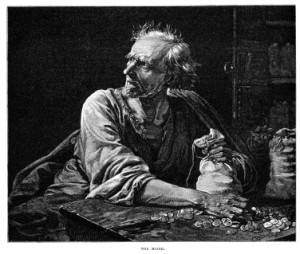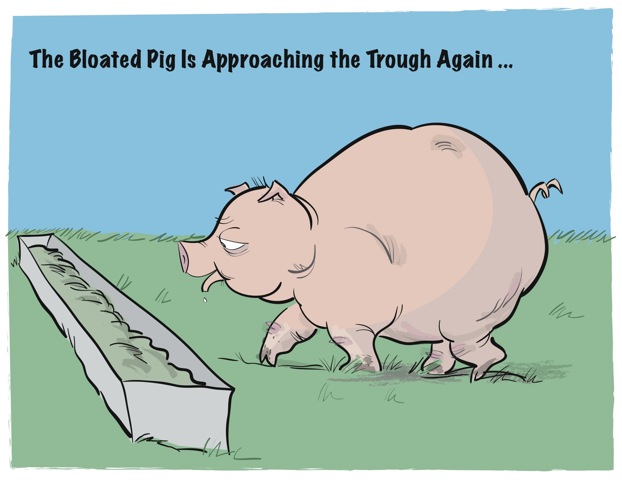The Epicurean Dealmaker is the nom de plume of an investment banker who has written a blog by that name since January 2007.
TED (as I’ll refer to him henceforth) recently achieved a measure of fame, or at least notoriety, by being interviewed and quoted in a New Yorker article calmly but deeply critical of the financial industry, titled What Good is Wall Street?
As he puts it:
I facilitate, justify, and advise parties to M&A transactions, when I am not advising against them. I have been doing this for almost two decades, mostly at a couple of big banks everyone has heard of and lately at an independent advisory boutique. I am one of the bad guys, if you like.
Or, as he suggests in a more recent post, referring to the changes in the investment banking business, “I am one of the good guys, if you please.”
The title of his blog refers to the apparent contradiction between the view of the philosopher Epicurus– that an imperturbable emotional calm is the highest good–and the view of his profession, which is about rather the opposite.
It’s not surprising that TED was chosen for that New Yorker interview—as his choice of name suggests, he has a talent for seeing contradictions in the world; or maybe he just likes playing at being schizophrenic. In any case, he has a unique perspective on the financial sector, and it’s a treat to interview him for Trust Quotes.

 CHG: First of all, TED thanks very much for speaking with us here today. I have thoroughly enjoyed reading your blog for several years now. In addition to the rare combination of philosophy and Wall Street, I have always found your comments to be grounded in common sense.
CHG: First of all, TED thanks very much for speaking with us here today. I have thoroughly enjoyed reading your blog for several years now. In addition to the rare combination of philosophy and Wall Street, I have always found your comments to be grounded in common sense.
Let’s start with some context. When you joined the field of “investment banking” 20 years ago, what did that term mean?
TED: Thanks, Charlie. I have enjoyed reading your informative and insightful blog on trust issues ever since I got involved online, too. And I promise that I will release your dog back to you unharmed as soon as I am convinced you have presented my views in the most favorable light possible.
As far as “investment banking” goes, when I started over two decades ago, the term described those individuals and firms which acted as middlemen in the global financial markets for capital and control. Our job was to bridge the gap between the providers of capital—investors, both individual and institutional—and the users of capital, which consist of for-profit businesses, state, local, and federal governments and other entities. In addition, investment bankers helped corporations buy and sell control of each other and subsidiary businesses, which is known as mergers and acquisitions, or M&A.
CHG: You and I both believe that investment banking in that sense plays some very socially useful roles. Could you elaborate?
TED: Yes. Well, for one thing, global and even domestic capital markets are huge and extremely diversified. Even in the narrowest of segments, like, for example, technology-oriented equity markets, the numbers of potential providers of capital and the potential users of capital are huge and ever changing. It is surprisingly hard for the people who need money to find the people who have money. And, once they have found each other, their interests, prejudices, and perspectives are so different that they have difficulty talking to each other.
This situation is tailor-made for a middleman, who understands the perspectives and needs of each side, to make a connection. A similar process takes place in M&A. An added wrinkle is that raising capital or doing M&A tends to be a very rare occurrence for most people who do it, so they usually need both a guide and an advocate to help them through the process. I believe this serves a useful socioeconomic function.
CHG: We’ll dig more deeply into this later, but what has the term “investment banking” come to mean these days?
TED: Well. Over the last decade or so, large, global, integrated investment banks have really turned into hedge funds in disguise. Either explicitly, in the form of acknowledged proprietary trading or in-house private equity funds, or implicitly, in the form of large security origination, warehousing, and distribution factories, large investment banks have shifted dramatically from a pure middleman or agency model to a proprietary one.
Most of the revenues and profits investment banks earned during the years leading up to the financial crisis came from trading or investing for their own accounts. This is a role and business which is in fundamental conflict with the role of middleman. For one thing, you act as a competitor to many of your usual clients. For another, it is a far riskier business model than traditional intermediary investment banking.
Part of this transformation resulted from the gradual convergence of commercial and retail banking—lending money to corporations and individuals, in its simplest form—and investment banking into what have become known as universal banks. (Universal banking is only a recent development in the United States, having been the norm almost everywhere else, notably Europe, since inception.)
The other part was the tremendous explosion in the amount and velocity (turnover) of funds available for investment around the globe, which led to increased investment and trading, which in turn offered increased opportunities for trading intermediaries like investment banks to take advantage of.
CHG: I have to ask, how was it that you, given your interests and personality, got involved in Wall Street in the first place?
TED: After graduating from college, I did a number of things completely unrelated to finance. It took me a while, but I eventually figured out that what I enjoyed most about all my different jobs was the learning curve. When a job became routine, I had to leave. Essentially, I discovered that I have the attention span of a gnat. This was quite a revelation for me. Eventually, via friends and by just soaking up the atmosphere of New York City in the 1980s, I discovered investment banking, which is never the same job twice. It’s been a marriage made in heaven ever since.
CHG: So let’s raise the big question: what has happened to Wall Street, and IB in particular, in the last two decades?
TED: Well, as I said above, the industry strayed from its historical roots in pursuit of ever-larger profits, and this led it to taking on ever-greater proprietary risks. In retrospect, it now seems my peers did not have a good handle on either 1) the risks embedded in their own institutions’ activities or 2) the risks embedded in the highly integrated global financial network in which investment banks played a pivotal role.
CHG: Jamie Dimon says the problem lies not with size—after all, Europe and Canada have higher concentration than we do–but with unregulated financial flows. Others, like Sy Sternberg, are quite clear that the problems arose from repeal of Glass-Steagall. What’s your view—what went wrong?
TED: At the end of the day, it’s pretty simple: banks just got too big. Too big to manage effectively, too big to understand the complex waterfall of risks embedded in their business activities, and too big and interconnected for governmental authorities to allow to fail when they did in fact blow up.
Look, the challenge is this: traditional investment banks, and traditional proprietary investment firms (like, e.g., hedge funds), are designed to take relatively high risks. That’s how they make money. The problem arises when their failure or potential failure propagates through the global financial system like an out-of-control virus—through interconnection, domino effects, sheer size, or whatever—and threatens catastrophic failure of the entire system.
That is what governmental authorities perceived as a serious possibility when Lehman Brothers blew up, and AIG, Merrill Lynch, and other major financial institutions were teetering on the brink of failure.
Note that the failures I am talking about were failures or potential failures of the wholesale financial system, not the retail system of deposit taking and consumer loans (although, of course, the entire mortgage industry was deeply implicated). Nevertheless, governmental officials in this country were seriously worried that cascading failures could have paralyzed the global financial system to the extent that automated teller machines would not have been able to dispense cash on Monday morning.
I have no reason to believe they were exaggerating.
CHG: Let’s start honing in on trust. The concept of a client, client relationships, client service, is hardly new to Wall Street, whether we’re talking about commercial banks, investment banks, or even traders. But has it changed? Does ‘client relationship’ mean something at McKinsey that it doesn’t mean at Goldman Sachs?
TED: Wall Street really has two different definitions of the word ‘client’. The one that operates in my business of advising on mergers and acquisitions and raising capital means someone to whom I have special obligations of care, duty, and best effort. My job is to help them accomplish something, usually a deal.
Whereas on the sales and trading side of the business, ‘client’ really means counter-party: someone to whom you have no obligation other than to satisfy the terms of a particular trade. The situation gets a little blurry, of course, because there are sales and trading counter-parties for whom investment banks act as true middlemen—known as market making—and these tend to be stable, recurring relationships which do involve trust.
But the more an investment bank acts for its own interests—like a hedge fund—the less it cares about any obligation to its counter-party other than the terms of the trade itself.
CHG: It seems to me, from afar, that major banks have become a mixture of two kinds of very different businesses, and for some reason they have become blurred in the minds of those banks. I see traditional client-centric businesses like what you signed on to do; and I see, for lack of a better term, casino-like businesses. I do not mean that term to be purely judgmental; casinos are legal, they play a social role of sorts, and we have ample examples of how they can be run fairly with solid regulation, e.g. the Nevada Gaming Commission. But they are, clearly, very different businesses.
Are they not so clearly different? Or have the bankers lost their discriminatory ability to discern the differences?
 TED: No, we can tell the difference. But you must understand that the casino bosses, as you call them, have taken over Wall Street. They have been in control for many years–because they made tons more money than my colleagues and me in the advisory and underwriting departments. And the Golden Rule on Wall Street is that he who makes the gold, makes the rules.
TED: No, we can tell the difference. But you must understand that the casino bosses, as you call them, have taken over Wall Street. They have been in control for many years–because they made tons more money than my colleagues and me in the advisory and underwriting departments. And the Golden Rule on Wall Street is that he who makes the gold, makes the rules.
CHG: Let’s go over full-strength to trust now. First, broadly speaking: what is the role of trust in a financial system?
TED: Well, at base it is absolutely essential. The word “credit” derives from the Latin verb credere, “to believe.” Again, to use a simple but powerful example, think of a savings account at your local bank. If you and everyone else who had savings at that bank tried to withdraw all your funds at the same time, the bank would not be able to disburse them. There simply isn’t enough money in the vault: it has been lent out many times over to businesses and individuals. And yet (normally) no one worries about this, because that is just how banks operate.
The details and relationships of savings to credit and investment in the global financial system are far more complex than your local bank’s accounts, but the idea is the same. Trust is absolutely essential to the proper functioning of any modern financial system.
CHG: Let me guess that, given how much more interdependent the world has become, there must be some areas of the financial sector where trust has actually increased. Is that true?
But I suppose the opposite is even more true, that there are many areas where trust has decreased. What areas stand out?
TED: I’m not sure trust has increased anywhere, to be honest. But then again, I’m not sure trust is actually a measure that makes sense in the financial system on a systemic basis. I am suspicious of global financial measures that cannot be quantified. How can you quantify trust?
In some sense, you could say trust is measured by credit ratings, credit spreads, and even the prices of financial assets like stocks and bonds themselves. But then again, prices are also the outcome of a balance of supply and demand. And there remains an enormous amount of money that needs to be put to work in financial assets.
I think it is safer to simply say that investors have always had to hold their noses when they invest. It’s just a matter of degree. Certainly, there is no doubt that trust of the financial system and its participants has plummeted among governments, regulators, and ordinary citizens.
CHG: What can we not trust now that we used to be able to trust? Is it particular markets? Or techniques? Or institutions? Where do you find trust is in particular short supply?
TED: Again, I’m not sure the basic challenge of trust in investment banking has changed at all. If you interact with an investment bank, your obligation as a potential customer is to understand what role the investment bank intends to play in your interaction. Is it acting as an agent, with all the attendant obligations of duty and trust, or as a principal, whose only obligations are to its own best interest?
Then, if it is the former, you must decide whether you trust the bank as agent, based upon all the criteria that you describe so eloquently in your own writing here. There is nothing particularly special or different about this kind of trust in investment banking. It is as it has always been. Perhaps only the scale has changed.
If it is the latter, then you as a customer are simply buying something from the investment bank, just like any other purchase. You want to make sure that the product is not defective, that it functions as advertised, and that it is not fraudulent in any way. These are measures of quality, or compliance, with norms and regulations, but they do not rise to the level of trust you normally speak of here, which is a deeper and more comprehensive set of criteria.
CHG: How does trust erode—what are the drivers of erosion? And what can we do to reverse the erosion? In particular, what are the proper roles of a few key institutions—regulators, legislators and educational institutions, to pick three.
TED: I will skip over this one, Charlie, if that’s okay. It doesn’t fit well with my primary conception of trust. I think of trust as a personal, one-on-one relationship, rather than a structural or institutional one. As an investment banker, I view it as my job to build trust with my clients, not anyone else’s.
CHG: Interesting. I’m very prone to that view too, that trust is primarily personal at root. But there are plenty out there who focus on ‘institutional trust,’ and will speak about audits, regulation and reliability statistics. Does that stuff leave you cold?
TED: Yes, it really does. For one thing, you can’t legislate morality. For another, the finance industry is so dynamic and volatile by its very nature that I sincerely doubt any externally imposed and monitored measures or regulation will be able to stay on top of the situation. Lastly, the proper role of regulation—which I believe in wholeheartedly, by the way—is not to impose or enforce someone’s ideas of trust or trustworthy behavior, but rather to prevent fraud, crime, and abuse. This is a much lower bar than establishing and maintaining trust.
CHG: Let’s deal with one sideways issue, the question of anonymity. Some commenters on this blog have been critical of anonymous bloggers. I think anonymity can play some interesting roles, and in some ways can be critical. You’re an anonymous blogger; your view on the subject?
TED: Anonymity can indeed foster all sorts of bad, irresponsible behavior, and I am not in favor of it in general. But blogging (or even commenting on another blog) under a pseudonym, as I do, is very different. Anonymity means no identity; pseudonymity means a false or assumed identity.
For one thing, operating under a pseudonym allows one to build up a corpus of opinion that can be judged in toto. Third parties can develop an opinion of your credibility and the value of your opinions for the very reason that you present a consistent identity, that you do in fact have a name. That this name is false, and a mask, is more a matter of convenience and perhaps professional necessity than it is of deception.
If people judge my words and opinions interesting, provocative, and worthy, it does not really matter whether they know me as TED or Joe Smith. One can always worry that a pseudonymous commenter or blogger has an ulterior agenda, but I suspect that is both hard to conceal over a long period of time (I have been blogging for over four years) and, frankly, beside the point. I challenge you to find anyone commenting in public who does not have at least one unstated agenda. And yet we should be able to judge and evaluate each other’s contributions nonetheless.
I claim to be an investment banker with over 20 years experience in the business. I claim many other things besides. Neither you nor anyone else really knows this to be true or not, and yet I hope my words and opinions themselves have earned me a measure of trust in this respect that a resume or a photograph would not add to. Perhaps I am naïve, but I believe that, given enough time, trust can be built upon words alone. My entire career testifies to that belief.
CHG: I think you’re a testament to the truth of that proposition. Thank you very much for spending time with us today!
—————————————————
The Epicurean Dealmaker on Trust and Investment Banking is number 19 in the Trust Quotes: Interviews with Experts in Trust series.
Recent interviews include:
Robert Eccles on Integrated Reporting (Trust Quotes #18)
Jordan and Barbara Kimmel on Trust Across America (Trust Quotes #17)
Sy Sternberg on Trust in the Life Insurance Business (Trust Quotes #16)
Read the complete Trust Quotes series.
 Right after Michael Lewis’s 60-Minutes appearance to promote his new book Flash Boys I wrote a blogpost about it.
Right after Michael Lewis’s 60-Minutes appearance to promote his new book Flash Boys I wrote a blogpost about it.
 Michael Lewis’s new book
Michael Lewis’s new book 
 CHG: First of all, TED thanks very much for speaking with us here today. I have thoroughly enjoyed reading your blog for several years now. In addition to the rare combination of philosophy and Wall Street, I have always found your comments to be grounded in common sense.
CHG: First of all, TED thanks very much for speaking with us here today. I have thoroughly enjoyed reading your blog for several years now. In addition to the rare combination of philosophy and Wall Street, I have always found your comments to be grounded in common sense. TED: No, we can tell the difference. But you must understand that the casino bosses, as you call them, have taken over Wall Street. They have been in control for many years–because they made tons more money than my colleagues and me in the advisory and underwriting departments. And the Golden Rule on Wall Street is that he who makes the gold, makes the rules.
TED: No, we can tell the difference. But you must understand that the casino bosses, as you call them, have taken over Wall Street. They have been in control for many years–because they made tons more money than my colleagues and me in the advisory and underwriting departments. And the Golden Rule on Wall Street is that he who makes the gold, makes the rules. Here are the ratings (% who liked) from Flixster for some of the movies playing this weekend:
Here are the ratings (% who liked) from Flixster for some of the movies playing this weekend: There’s a lot of buzz about "trust" this year.
There’s a lot of buzz about "trust" this year..jpg) Bill Bachrach
Bill Bachrach